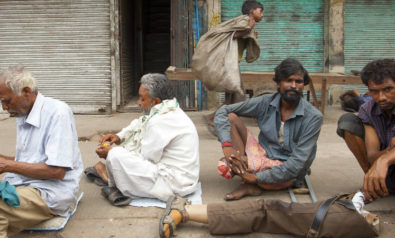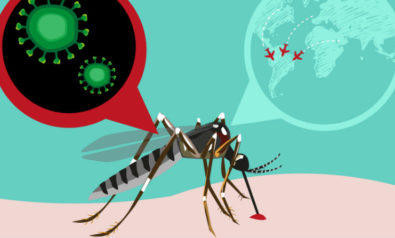What is the UAE doing to combat its growing obesity epidemic?
How can health education develop a public health infrastructure based on prevention? In 2011, Forbes ranked the United Arab Emirates (UAE) number 18 on a list of countries with the highest obesity rates, estimating that 68.3% of the country’s citizens are overweight.
Obesity is a risk factor for diseases including Type 2 diabetes, chronic kidney disease, osteoarthritis, cardiovascular disease and cancer. Public health initiatives and disease prevention are only effective through means of education, which the UAE is determined to improve.
Obesity is not a problem for the UAE alone as it has increased in prevalence across all Gulf Cooperation Council (GCC) countries. Due to similar cultural and social norms, this issue has become a major public health challenge for the region.
The UAE’s obesity rates have not slowed in recent years. As a result, there is a growing incidence of Type 2 diabetes in children, which is alarming. What factors have contributed to this problem? How can health education be used as an effective tool to develop a more health conscious society?
Factors
Generous hospitality is imbedded in Arab customs and culture. Food is central in gatherings and social events, especially the offering of sweets—juices, dates, chocolates. Traditional Arab foods tend to be unhealthy and fattening, with an increased intake of saturated fats and sugars and decreased intake of cereals, legumes, vegetables and fruits.
According to The National, “half of all women and a third of all men in the region do not exercise enough. Studies by the World Health Organization (WHO) found that the Eastern Mediterranean Region, of which the UAE is a part of, was second only to the Americas in terms of low activity rates.” There have been efforts made by the UAE to create parks and open spaces to encourage physical activity. However, in general, a sedentary lifestyle still prevails.
Furthermore, the population is at risk for developing a myriad of mental health problems such as depression, low self-esteem or issues related to body image due to obesity and a lack of activity. Preventative measures can be taken to reverse these dangerous trends. However, the culture of the GCC states does not have a preventative health care mindset.
This fatalistic behavior is rooted in the Arab and Muslim culture’s surrender to “God’s will.” This attitude offsets the recognition of necessary preventative measures. Many patients, especially those of Bedouin origins, who hold tightly onto traditions and are not educated on health awareness, do not believe in modern medicine. The combined intersections of culture, religion, eating habits and lifestyle choices make health education a growing challenge to integrate into not only schools, but throughout society as a whole.
Economic development in the UAE has experienced progress on a variety of fronts: better access to education, improved living standards and the rise and use of information and communication technologies.
Fast Food and Health Education
However, not all advancements have been associated with positive outcomes. Given the impact of globalization, an influx of Western fast food restaurants has dominated the food industry in the UAE: McDonald’s, IHOP, Pizza Hut, KFC and Shake Shack just to name a few. The “Mcdonaldization” of the food industry has enabled individuals to enjoy a more efficient, predictable and timely food experience. According to George Ritzer, “They offer a limited, simple menu, that can be cooked and served in an assembly line-fashion.” Adding to this, most fast food restaurants have delivery options.
Combining these factors—along with a sedentary lifestyle, hot climate and limited outdoor activity—creates a recipe for disaster, especially for the most vulnerable population: children. The number of overweight children has steadily increased over the past two decades, from 25.6% in 1980 to 31.2%—a third of the nation’s youth—in 2013. Childhood obesity in the UAE is ranked 16th in the world. What is being done?
In 2015, officials announced that health education would be incorporated into Abu Dhabi’s school curricula by the 2016-17 academic year. According to Amer Al Kindi, a health manager for Abu Dhabi Education Council, “it will be a separate curriculum that will be integrated into the system at all grades.”
In a recent study analyzing obesity rates in students attending government schools in the Emirate of Ras Al-Khaimah, it was found that obesity starts in toddlers and is most prevalent among boys. Early intervention strategies, such as improved school health policy and practice through initiatives involving better nutrition choices and exercise classes are recommended to improve the quality and delivery of health education. Initiatives need to be created to raise public health awareness of issues affecting both children and adults.
Health Education Initiatives
The Health Authority of Abu Dhabi, along with the Abu Dhabi Education Council, launched the Iftah Ya Simsim initiative for health education this year across schools to promote and raise awareness of health issues for children. Iftah Ya Simsim is comparable to the American children’s TV show Sesame Street. The initiative contains a series of educational materials, including activities for students, parents and teachers. Over 150 Arabic teachers across Abu Dhabi are offered training workshops and necessary resources and tools to promote and encourage a healthy lifestyle inside the classroom.
What must remain clear is the role, importance and need for health education, which comes in many forms. It is not solely the responsibility of the education sector, but both public and private sectors, the media and the medical community.
The program focuses on nutrition, physical activity, oral health, hygiene and vaccination. In addition, the overall campaign also incorporates the launch of an app to encourage the adoption of healthy habits through educational video games. It is a fun and interactive way to not only raise public health awareness, but to engage students, parents and teachers in the process. Children need to learn at an early age the impact of their eating habits and lifestyle choices.
As per the UAE’s 2021 Vision, the Ministry of Health and Prevention aims to decrease the prevalence of obesity among children between the ages of 5-17 to a target goal of 12%.
To reach this target goal, a variety of initiatives have been created to tackle childhood obesity. For example, over 1,200 students from public and private schools participated in the “let’s walk” activity in April 2015. The walkathon is part of the “Healthy Children 2021” national campaign to promote the importance of exercise and a healthy lifestyle.
Collective Responsibility
Health education should not only come in the form of initiatives, school curricula or awareness campaigns. Rather, physicians also play a vital role in a patient’s overall welfare; they act as educators, role models and advisors. An educated patient, who understands his or her illness or risk for illness, is more likely to be accountable and invested in health care. However, there are many instances where physicians fail to inform and educate their patients.
Generally speaking, doctors in the Arab world do not take the time to educate their patients, while at the same time most Arab patients do not feel the need to understand the science behind their ailment. There are many examples of cases where diseases such as diabetes can be prevented, but due to a lack of intervention measures by the doctor, patients will likely develop the disease.
The UAE is aware of these tremendous health challenges and has been proactive in creating initiatives, partnerships and importing Western health institutions.
In the United States, the UAE has a long-standing relationship with the Children’s National Medical Center in Washington, DC. Through generous donations from Abu Dhabi, the Sheikh Zayed Institute for Pediatric Surgical Innovation at Children’s National Medical Center was established in 2009. In 2015, other reputable Western institutions such as Cleveland Clinic opened their doors in Abu Dhabi. The UAE continues to establish partnerships with US health institutions for the purpose of gaining Western health values, disseminating cutting edge research and creating preventative public health programs, as well as enhancing medical education and care.
The UAE has taken progressive steps to tackle some of the most challenging health issues facing its citizens today. What must remain clear is the role, importance and need for health education, which comes in many forms. It is not solely the responsibility of the education sector, but both public and private sectors, the media and the medical community. In order for the UAE to witness meaningful and lasting change, society as a whole would need to make conscious health choices and lead by example for future generations to come.
The views expressed in this article are the author’s own and do not necessarily reflect Fair Observer’s editorial policy.
Photo Credit: Keoni Cabral / Flickr
 We bring you perspectives from around the world. Help us to inform and educate. Your donation is tax-deductible. Join over 400 people to become a donor or you could choose to be a sponsor.
We bring you perspectives from around the world. Help us to inform and educate. Your donation is tax-deductible. Join over 400 people to become a donor or you could choose to be a sponsor.
Support Fair Observer
We rely on your support for our independence, diversity and quality.
For more than 10 years, Fair Observer has been free, fair and independent. No billionaire owns us, no advertisers control us. We are a reader-supported nonprofit. Unlike many other publications, we keep our content free for readers regardless of where they live or whether they can afford to pay. We have no paywalls and no ads.
In the post-truth era of fake news, echo chambers and filter bubbles, we publish a plurality of perspectives from around the world. Anyone can publish with us, but everyone goes through a rigorous editorial process. So, you get fact-checked, well-reasoned content instead of noise.
We publish 2,500+ voices from 90+ countries. We also conduct education and training programs
on subjects ranging from digital media and journalism to writing and critical thinking. This
doesn’t come cheap. Servers, editors, trainers and web developers cost
money.
Please consider supporting us on a regular basis as a recurring donor or a
sustaining member.
Will you support FO’s journalism?
We rely on your support for our independence, diversity and quality.


















